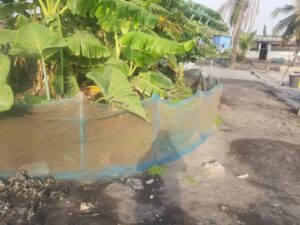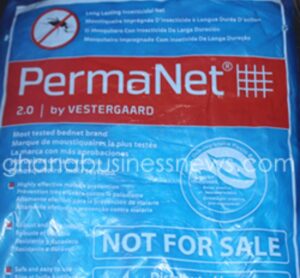“Malaria Nets Misused in Ghana: The Urgent Need for Education and Accountability.
 In Ghana’s ongoing battle against malaria, the government, through the Ghana Health Service (GHS), has invested significantly in distributing insecticide-treated nets (ITNs) to households nationwide. These nets are a cornerstone of the National Malaria Elimination Programme (NMEP), aiming to reduce malaria morbidity and mortality rates across the country.
In Ghana’s ongoing battle against malaria, the government, through the Ghana Health Service (GHS), has invested significantly in distributing insecticide-treated nets (ITNs) to households nationwide. These nets are a cornerstone of the National Malaria Elimination Programme (NMEP), aiming to reduce malaria morbidity and mortality rates across the country.
Despite these efforts, there have been reports of ITNs being repurposed for activities such as fencing gardens and fishing, particularly in communities near water bodies. This misuse not only undermines the effectiveness of malaria prevention strategies but also poses environmental concerns. The Parliamentary Select Committee on Health has cautioned against such practices, emphasizing that ITNs are intended solely for malaria prevention.
Interviews conducted by Eric Woode popularly known as Mr. Woode, a blogger and host of Mr. Woode Studios, have revealed that some individuals avoid sleeping under ITNs due to discomfort, citing feelings of heat during sleep. This highlights a gap in public education regarding the proper use and benefits of ITNs.
 To address this issue, a multifaceted approach is necessary:
To address this issue, a multifaceted approach is necessary:
1. Enhanced Public Education: The GHS and NMEP should intensify educational campaigns to inform the public about the importance of using ITNs correctly. Emphasizing the health benefits and addressing misconceptions can encourage proper usage.
2. Community Engagement: Involving community leaders and influencers can help disseminate information effectively and foster a sense of responsibility among residents.
3. Monitoring and Accountability: Implementing measures to monitor the distribution and usage of ITNs can help identify misuse. Establishing consequences for improper use may deter individuals from diverting ITNs for unintended purposes.
The government’s commitment to malaria elimination is evident in its strategic plans and resource allocation. However, the success of these initiatives relies heavily on public cooperation and adherence to recommended practices. By enhancing education, engaging communities, and ensuring accountability, Ghana can move closer to achieving its goal of a malaria-free nation.


